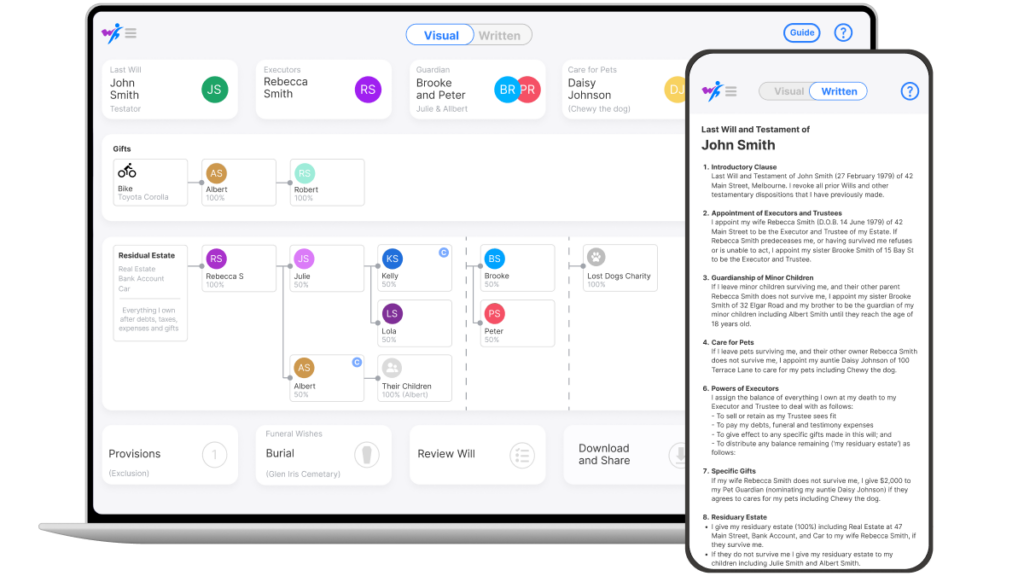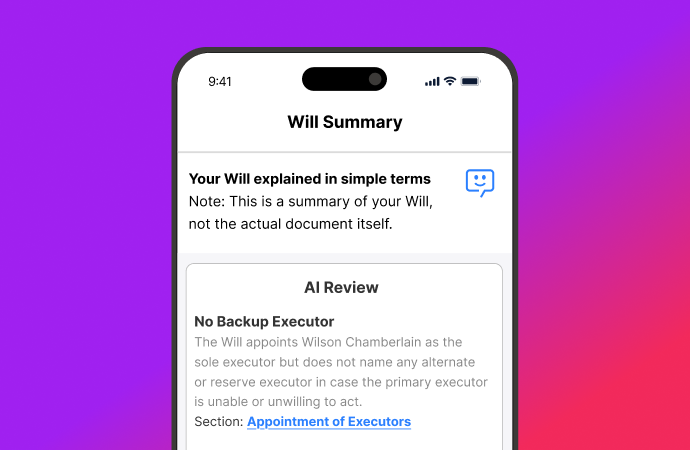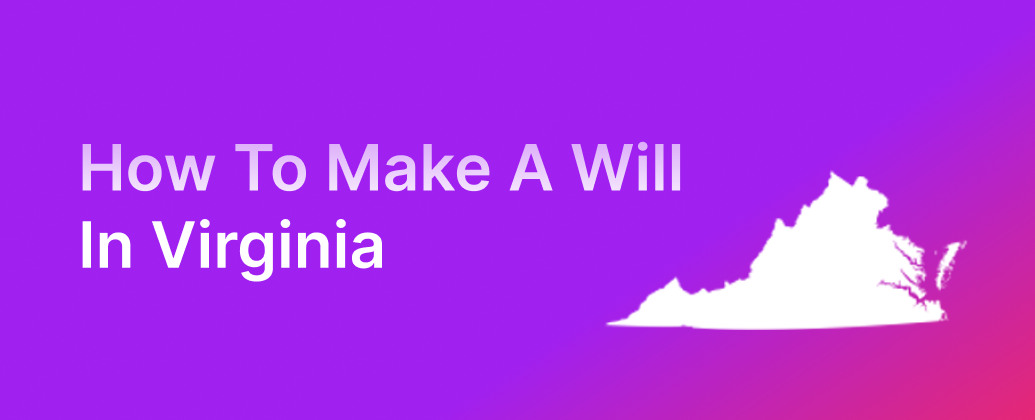
How To Make a Will in Virginia
Step-By-Step Guide for creating a Last Will and Testament In Virgina
Introduction: What is a Will?
Your Will is an important legal document that outlines how your possessions and property will be managed and distributed after your death. It allows you to make key decisions, such as naming guardians for your minor children to ensure their care and well-being. Without a will, Virginia’s intestacy laws determine how your estate is handled, which may not align with your wishes. By creating a will, you take control of these important decisions, protect your legacy, and provide peace of mind and security for your loved ones.
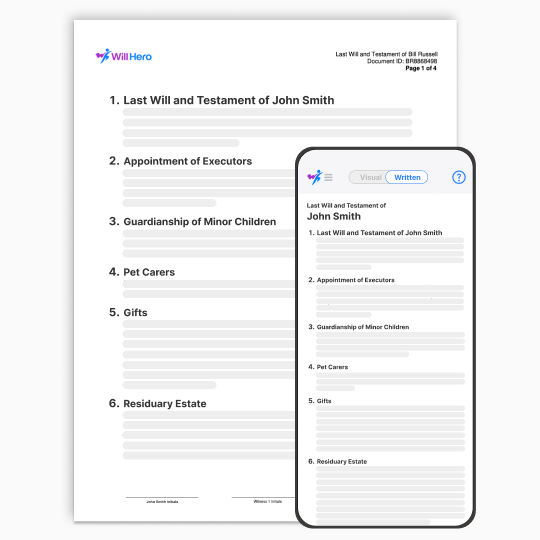
Laws for Creating a Will in Virginia
When making a will in Virginia, you must adhere to specific legal requirements. Failing to meet these criteria could result in your will being invalid, causing complications during probate. Below are the key legal requirements for creating a Will in Virginia:

You must be at least 18 years old. Exceptions for minors that are legally emancipated.

You must be of sound mind.
This means you understand the extent of your assets, the act of creating a will, and the people you want to include as beneficiaries.

Your Will must be in written document. Oral (nuncupative) wills are generally not recognized in Virginia, except under very limited circumstances (e.g., imminent death and for certain personal property).

The Will must be signed by the testator (person making the Will), and must be signed by two competent witnesses who are present at the same time the testator signs.

Virginia recognizes holographic wills (entirely handwritten and signed by the testator) if two witnesses can testify that the handwriting and signature are the testator’s.

Notarization is not required to make a Will valid in Virginia. However, a Will can be made “self-proving” by including a notarized affidavit from the testator and witnesses.
By following Virginia’s will laws, you can ensure your estate is distributed according to your wishes. If your will doesn’t meet these legal requirements, it could be contested or ruled invalid, leaving your estate’s distribution up to the court.
Step-by-Step:
How to Draft Your Will in Virginia
1. Choose an Executor
An executor plays a vital role in managing your estate after your passing. This person carries out the instructions in your will, oversees asset distribution to beneficiaries, settles any debts, and ensures compliance with legal requirements during probate.
When selecting an executor, prioritize someone trustworthy, dependable, and organized. This individual should handle financial and legal matters efficiently. Many people choose close family members, reliable friends, or professional advisors for this role.
It’s wise to also appoint a backup executor. This ensures that someone is available to take over if your primary choice is unable or unwilling to perform their duties.
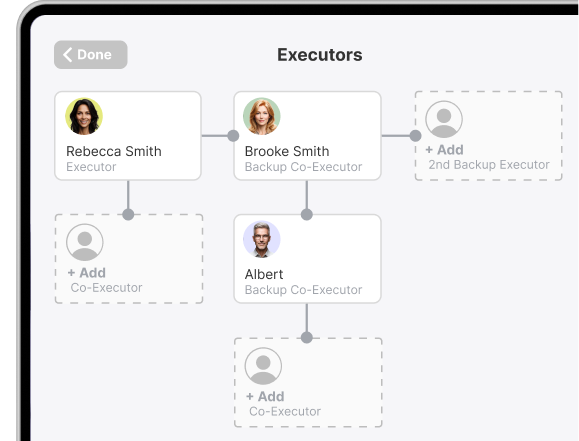
2. Appoint a Guardian for Minor Children
If you have children under 18 (or plan to in the future), naming a guardian in your will is essential. This choice ensures their care and upbringing reflect your wishes. The guardian you select will handle important decisions regarding their education, healthcare, and overall well-being.
While Virginia law does not require you to designate a guardian, doing so is strongly recommended. Without a named guardian, the court decides who will care for your children, and this decision may not align with your preferences. To avoid this uncertainty, take proactive steps by naming a guardian in your will.
To add security, include a backup guardian. If your primary choice becomes unavailable or unwilling to take on the responsibility, the backup can step in and ensure your children receive the care they need.
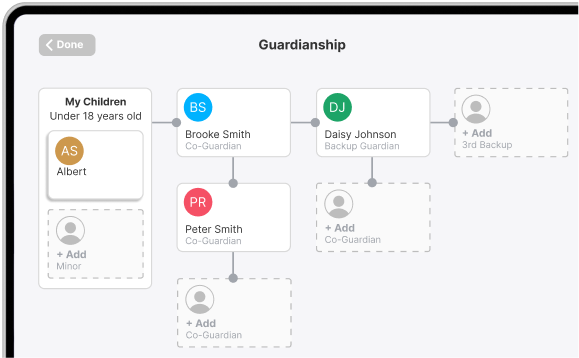
3. Name a Pet Carer
In Virginia, your will can include provisions to ensure your pets are cared for after your passing. By appointing a caregiver and setting aside resources, you provide peace of mind that your pets will be well looked after.
Although not required by law, naming a pet caregiver prevents the responsibility from falling to your executor, who may not prioritize your instructions. Selecting a trusted individual ensures your pets receive proper care and love.
For extra security, appoint a backup caregiver. If your primary choice cannot fulfill their role, the backup can step in to provide care.
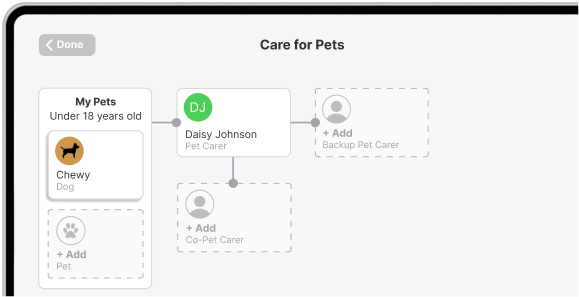
4. Decide who inherits your Residual Estate
Your residual estate includes remaining assets after debts, expenses, and specific gifts are handled. To ensure clarity, name beneficiaries—such as family, friends, or charities—using their full legal names. Specify the exact portions they will receive. Include backup beneficiaries to create a contingency plan in case your primary choices cannot accept the inheritance.

5. Gifting Specific Items
If you plan to leave specific possessions—like family heirlooms, jewelry, real estate, vehicles, or cash—to individuals, include these details in your will. Provide clear descriptions, appraisals, or serial numbers to avoid misunderstandings or disputes. Creating an inventory of your assets ahead of time ensures your wishes are communicated effectively, and all items are accounted for properly.

6. Any Additional Instructions or Provisions?
You can include special instructions in your will to address specific preferences, such as burial arrangements or directions to sell certain assets. You may also make gifts conditional or place them in trust until beneficiaries reach a certain age. These provisions allow you to personalize your will and ensure your unique wishes are respected and fulfilled.
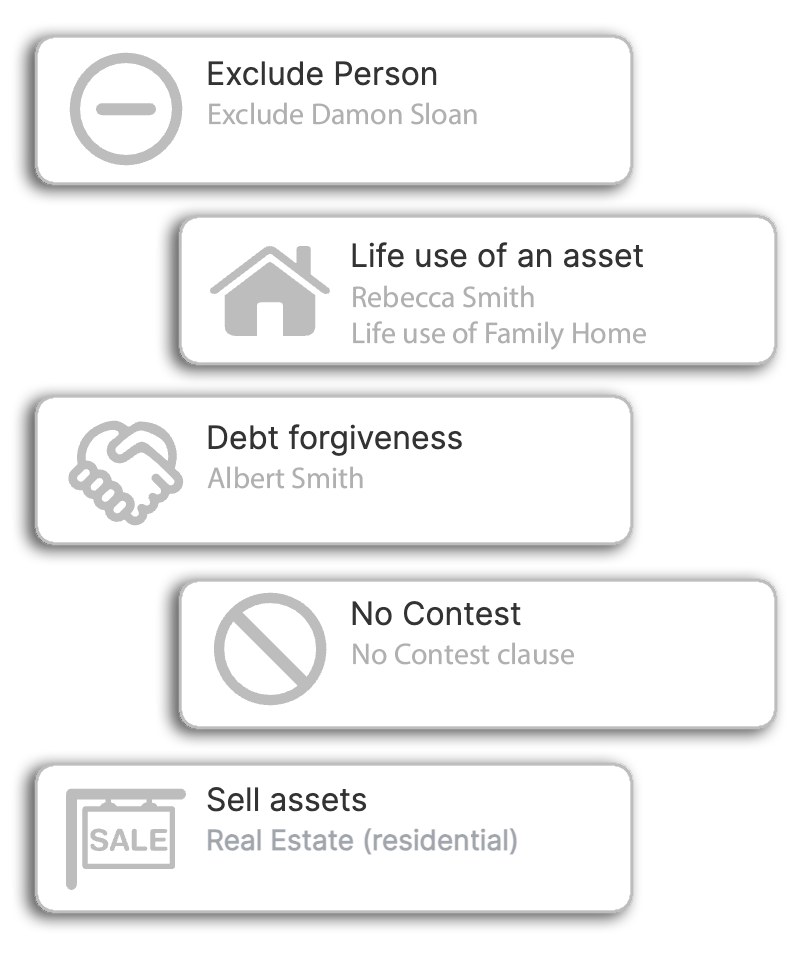
Review Your Will
Confirming Roles in Your Will
Before finalizing your will in Virginia, ensure your chosen executors, guardians, and pet caregivers fully understand their responsibilities and agree to take on these roles. This proactive step helps reduce complications during estate administration.
Additionally, confirm with both primary and backup individuals to ensure they are prepared and available to fulfill their duties if necessary. This confirmation process minimizes uncertainty and ensures a smoother execution of your wishes.

Executors
Guardians
Pet Carers
Test Your Will
Before completing your will, it’s essential to evaluate your decisions and consider potential scenarios, such as the loss of beneficiaries or unmet conditions. This process ensures your estate distributes assets according to your wishes, even in unexpected circumstances. Scenario testing helps you visualize how adjustments impact the allocation of your assets, enabling you to make informed choices that align with your goals and priorities.

Signing Your Will
Signing Your Will In Front of Witnesses
After drafting your will, the next crucial step is signing it to make it legally valid in Virginia. The signing process must follow specific state requirements.
Witness Requirements
To validate your will in Virginia, you need to sign it in the presence of at least two competent witnesses. These witnesses must:
- Be at least 18 years old.
- Clearly understand that they are witnessing the signing of your will.
- Sign the will after you, confirming that they were present and that you appeared to be of sound mind during the signing.
Self-Proving Affidavit
While not mandatory, creating a self-proving affidavit can streamline the probate process. A self-proving affidavit requires the testator (you) and the witnesses to sign the affidavit in the presence of a notary. This eliminates the need for witnesses to testify in probate court to validate the will.
Note: Witnesses in Virginia can also serve as beneficiaries, but this may lead to disputes. It’s wise to choose disinterested witnesses to avoid potential conflicts.
Storing Your Will
Keep Your Will Safe
To protect your will, keep the original signed document in a secure place. In Virginia, only the original copy is legally valid—digital copies hold no legal weight. Losing or damaging the original can cause delays and complications.
Below are trusted options for storing your will securely:
Store at Home
Use a fireproof and waterproof safe to protect against damage. Let your executor know its location.
With an Attorney
Many estate attorneys offer secure storage for original wills as part of their services.
Trusted Person
Choose a reliable family member or friend who will safeguard the will and retrieve it when needed.
Reminder: Digital copies are useful for reference but hold no legal weight. Inform your executor where to find the original will to avoid delays.
FAQs: Making A Will in Virginia
1. What Are My Options for Making a Will in Virginia?
In Virginia, there are three main options to create a legally valid will:
Hiring a Lawyer: This option works best for individuals with complex estates, such as trusts, significant assets, or unique family arrangements. Attorneys provide customized advice to ensure your will meets all legal requirements in Virginia.
Using an Online Platform: For simpler estates, platforms like Will Hero offer an affordable, guided way to create a legally valid will. These platforms comply with Virginia’s laws and are convenient for many users.
Handwritten Will (Holographic Will): Virginia accepts handwritten wills if they meet specific criteria. The will must be entirely written and signed by the testator. Two competent witnesses must testify in court that the handwriting matches the testator’s. Without witnesses, the will may face challenges during probate.
2. Do I Need a Lawyer to Make a Will in Virginia?
No, hiring a lawyer is not required to create a valid will in Virginia. For straightforward estates, you can draft the will yourself or use an online platform like Will Hero. These tools provide an affordable, user-friendly way to ensure compliance with Virginia’s legal requirements.
However, consulting an attorney is wise if your estate involves complexities, such as trusts, tax planning, or unique family dynamics. An attorney can provide personalized advice, address specific challenges, and ensure your will meets all legal standards and your unique needs.
3. Are Handwritten (Holographic) Wills Valid in Virginia?
No, holographic wills are not valid in Virginia unless they meet all formal legal requirements. To be valid, a will must be in writing, signed by the testator (the person making the will), and witnessed by at least two competent individuals present at the time of signing. Unlike some states, Virginia does not allow exceptions for holographic wills that lack witnesses.
Handwritten wills may reflect the testator’s intentions but will likely not hold legal weight unless they satisfy these requirements. To avoid disputes, ensure your will complies with Virginia law by including the necessary witness signatures.
4. How Much Is the Inheritance Tax in Virginia?
Virginia does not have an inheritance tax or estate tax. Beneficiaries in Virginia generally do not need to pay a state inheritance tax on assets they inherit. However:
Federal Estate Tax: If the estate’s total value exceeds the federal estate tax exemption limit ($12.92 million per individual in 2023), federal estate taxes may apply. This is handled at the estate level, not by individual beneficiaries.
Income Tax: Beneficiaries may still owe taxes on income generated from inherited assets, such as dividends, interest, or distributions from retirement accounts (e.g., traditional IRAs or 401(k)s).
Real Estate and Other Property Taxes: Regular property taxes or capital gains taxes may apply if the inherited property is sold later.
If you have additional concerns about taxes on an estate, consult with a tax professional or estate attorney to ensure compliance with federal laws and to address any potential liabilities
5. Do I Need to Notarize My Will in Virginia?
No, notarization is not required to make a will legally valid in Virginia. However, adding a self-proving affidavit can simplify the probate process. To create a self-proving affidavit, you and your witnesses sign the document in the presence of a notary. This process removes the need for witnesses to testify in court later to validate the will.
6. Can I Change My Will After It’s Signed?
Yes, you can update or modify your will at any time if you are of sound mind. There are two primary ways to make changes:
- Add a Codicil: A codicil serves as a formal amendment to your existing will. You must sign it in the presence of witnesses, following the same legal requirements as your original will.
- Create a New Will: Drafting a new will explicitly revokes all previous wills and codicils. Be sure to destroy old copies to avoid confusion or disputes.
7. What Happens if I die without a Will?
Probate is the legal process in Virginia where a deceased person’s will is validated, and their estate is administered. This process ensures that the deceased’s assets are distributed according to their will or, if there is no will, according to Virginia’s intestacy laws.
During probate, several key steps occur:
- Filing the Will: If a valid will exists, it must be filed with the circuit court in the locality where the deceased person lived. If no will exists, the estate is considered “intestate.”
- Appointing an Executor or Administrator: The executor named in the will oversees the estate’s administration. If there’s no will, the court appoints an administrator.
- Inventory and Valuation: The executor/administrator identifies and values all assets in the estate, such as real estate, bank accounts, and personal property.
- Notifying Creditors and Paying Debts: Creditors are notified of the probate process, and outstanding debts, taxes, and expenses are paid from the estate’s assets.
- Distributing Assets: Once all debts and taxes are settled, the remaining assets are distributed to beneficiaries named in the will or, if no will exists, according to Virginia’s intestacy laws.
In Virginia, not all estates go through full probate. Smaller estates (valued under $50,000) may qualify for simplified procedures using a Small Estate Affidavit. Additionally, assets with designated beneficiaries or those held in trusts generally avoid probate.
Probate can take several months to a year or longer, depending on the estate’s complexity. While it’s a necessary process to protect the deceased’s wishes and creditors’ rights, planning ahead (such as using trusts or beneficiary designations) can help minimize the need for probate.
8. What is Probate?
Probate is the legal process of settling a deceased person’s estate, ensuring their assets are distributed according to their will (if one exists) or under Virginia’s intestacy laws if no will is present. This process is overseen by the court and typically includes the following steps.
Here’s a breakdown of probate in Virginia:
- Filing the Will: If the deceased left a valid will, it must be filed with the probate court in the county where they lived.
- Appointing an Executor or Administrator: The court appoints an executor (if named in the will) or an administrator (if there’s no will) to manage the estate.
- Inventorying Assets: The executor or administrator compiles a list of the deceased’s assets, including property, bank accounts, and personal belongings.
- Paying Debts and Taxes: The estate’s debts, such as outstanding bills, loans, and taxes, must be paid before distributing any remaining assets.
- Distributing Assets: After debts and expenses are settled, the remaining assets are distributed to beneficiaries (if there’s a will) or heirs (if there’s no will) according to Virginia’s intestacy laws.
Types of Probate in Virginia:
- Formal Probate: Used for larger or more complex estates and requires court supervision throughout the process.
- Unsupervised Probate: An option for simpler estates where the executor can manage the process with less court involvement.
- Small Estate Administration: Estates valued under $50,000 may qualify for a simplified process that doesn’t require full probate.
Why is Probate important
Probate ensures the legal transfer of assets, protects creditors’ rights, and provides an orderly process for resolving disputes among heirs or beneficiaries. However, it can be time-consuming and costly, which is why some individuals use estate planning tools like trusts to avoid or simplify probate.
9. How Long Does Probate Take?
Probate in Virginia typically takes six months to over a year, depending on the estate’s complexity. Larger estates, disputes among beneficiaries, or significant debts can extend the timeline. Creditors are given six months to submit claims, which may delay final asset distribution.
For estates under $50,000, Virginia offers a Small Estate Affidavit process, often completing probate in weeks. Proper planning, such as trusts or beneficiary designations, can help minimize delays or avoid probate entirely.
10. Can Probate Be Avoided?
Yes, probate can often be avoided in Virginia by taking proactive steps to transfer assets outside of the probate process. Here are some common methods:
Revocable Living Trusts: By placing your assets in a trust, they can pass directly to your beneficiaries without going through probate. This is one of the most effective ways to avoid probate for significant assets.
Joint Ownership with Right of Survivorship: Assets held jointly with another person (such as a home or bank account) automatically pass to the surviving owner upon death, bypassing probate.
Transfer-on-Death (TOD) Designations: Virginia allows transfer-on-death designations for certain assets, such as real estate, vehicles, and financial accounts. These assets transfer directly to the named beneficiary without going through probate.
Payable-on-Death (POD) Accounts: Bank accounts and similar financial assets can be set up as payable-on-death, allowing the funds to go directly to a designated beneficiary.
Small Estate Affidavit: If the total value of the estate is under $50,000, Virginia law permits a simplified process using a Small Estate Affidavit, which avoids formal probate.
By planning ahead and using these strategies, you can help ensure your estate is transferred to your beneficiaries quickly and efficiently, avoiding the time and expense associated with probate.
Ready to Start your Will?
Starting your will can feel overwhelming, but Will Hero simplifies the process. Our platform offers an intuitive, visual way to draft your will, clarify your wishes, and navigate estate planning. With expert guides and an AI Assistant, you stay supported every step of the way. Plus, Scenario Testing helps you prepare for various life events, ensuring your will works in any situation.
At Will Hero, we focus on making will creation simple, engaging, and even fun. Start today to safeguard your legacy and give peace of mind to you and your loved ones!
